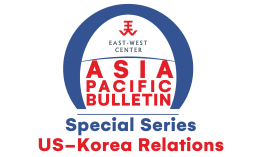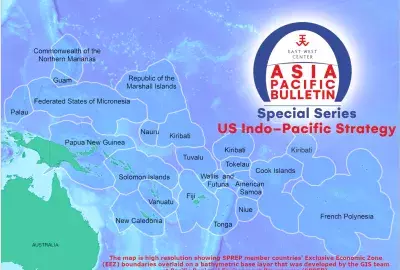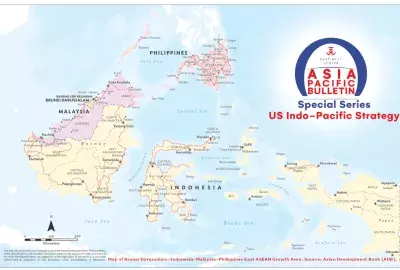Error message

|
Dr. Jin Kyo Suh, Senior Research Fellow at the Korea Institute for International Economic Policy, explains that "Korea-US relations are entering a new era with the inauguration of the Yoon Seok-yeol government.." as "President Yoon Seok-yeol himself is well aware of the importance of universal values, such as freedom, democracy and human rights." |
Korea-US relations are entering a new era with the inauguration of the Yoon Seok-yeol government. The general view is that the Yoon government will see further development of the Korea-US alliance compared to the previous administration of Moon Jae-in. This is not because a conservative government that values relative security has come to power, but because the Yoon administration will prioritize the importance of the Korea-US relationship. In particular, President Yoon Seok-yeol himself is well aware of the importance of universal values, such as freedom, democracy and human rights, which are also core values in the Biden administration’s foreign policy. For example, the term freedom appears 35 times in President Yoon Seok-yeol's inaugural speech. His speech indicates Korea will strengthen its solidarity with the United States and other free, democratic countries. Hence, it is expected that, with these core universal values as a common base, it will not be difficult to strengthen Korea-US relations compared to the previous administration. This is well documented in the joint declaration of the recent Korea-US summit. In the joint declaration, both leaders said they would “pledge to develop, use and advance technologies in line with shared democratic principles and universal values.”
From this perspective, the points that the Yoon Seok-yeol administration should focus on in Korea-US economic relations can be summarized as follows. First of all and most importantly, Korea should actively participate in the newly launched Indo-Pacific Economic Framework (IPEF) , which is a new US-led regional economic framework designed to tackle 21st century economic challenges. In this regard, it is a good thing that President Yoon officially mentioned Korea's participation in the IPEF and participated in the IPEF high-level meeting. However, the Yoon Administration must go beyond words and actively participate—including taking on leadership roles—in the four IPEF pillars: (1) Connected Economy, focusing on fair and resilient trade; (2) Resilient Economy, focusing on supply chains; (3) Clean Economy, focusing on infrastructure, clean energy, and decarbonization; (4) Fair Economy, focusing on taxes and anti-corruption. The first pillar, where trade-related issues are concentrated, is important for both countries. This is because the outcomes of the negotiations in this pillar are likely to become internationally binding norms. As Korea prepares for a transition to a digital economy, the country should, in concert with the United States, play a leading role in creating global standards for digital trade and technology by providing constructive ideas for negotiations on digital trade and standards. At the same time, it is also important for Korea and the United States to work together so that the digital economy can benefit workers, consumers, and small and medium-sized enterprises (SMEs).
However, there are some challenges in IPEF negotiations. If a new supply chain for key items such as semiconductors and electric vehicle (EV) batteries is established around IPEF participating countries, it may result in China being effectively barred from the new supply chain. Considering that Korea’s exports to China and Hong Kong account for more than 30 percent of its total exports, creating a China-excluded supply chain could have a significant impact on the Korean economy. Additionally, Korea and the United States have different positions cross-border data flow protection or data localization in digital trade. In order to close this gap and successfully launch the IPEF, both Korea and the United States need to understand each other’s special situation and position.
Second, the Yoon government should work towards upgrading the KORUS FTA. The KORUS FTA is a strong foundation for strengthening economic ties between the two countries. The KORUS FTA has made a clear and decisive contribution to increased bilateral trade and investment over the past decade. However, the FTA is dated as negotiations ended in 2006 and the agreement came into effect in 2012. In light of today’s rapidly developing global economy, some portions of the agreement are out-of-date. For example, the importance of eco-friendly measures in response to climate change was not prioritized at the time, thus the related content of the KORUS FTA is very general. However, we are now living in an era where industries must adjust to climate change and the economy must shift towards low energy consumption and carbon neutrality. Therefore, South Korea and the United States should work together to upgrade the environmental aspects of the KORUS FTA.
Lastly, it is necessary to expand direct investment between Korea and the United States. Since the KORUS FTA came into force, direct investment between the two countries has increased. In 2012, the US direct investment position in Korea was $32.2 billion, but in 2020, it was $33.9 billion , an increase of about 5.3 percent. During the same period, Korea’s direct investment position in the United States increased about 2.5 times from $25.3 billion to $63.7 billion. However, in 2020, US direct investment in Korea accounted for only 3.5 percent of total US direct investment in Asia and the Pacific. Meanwhile, Korea’s direct investment in the United States accounts for 26.6 percent of Korea's total global direct investment. Therefore, there is still a lot of room for US direct investment in Korea to grow. To this end, Korea should make efforts to improve its domestic investment environment. Both Korea and the United States need to strengthen investment cooperation, especially for the development of nuclear power generation technology, clean energy and decarbonization technology.
Under the Yoon Seok-yeol administration, the relationship between Korea and the United States is expected to improve. Previously, the ROK-US relationship was centered on security and economics, but, going froward, the future ROK-US relationship will leap into an alliance that shares advanced technology and values as well as security and economic concerns. To this end, it is important for both Korea and the United States to trust each other. Without faith in each other, nothing can begin.

|
Dr. Jin Kyo Suh, Senior Research Fellow at the Korea Institute for International Economic Policy, explains that "Korea-US relations are entering a new era with the inauguration of the Yoon Seok-yeol government.." as "President Yoon Seok-yeol himself is well aware of the importance of universal values, such as freedom, democracy and human rights." |
Korea-US relations are entering a new era with the inauguration of the Yoon Seok-yeol government. The general view is that the Yoon government will see further development of the Korea-US alliance compared to the previous administration of Moon Jae-in. This is not because a conservative government that values relative security has come to power, but because the Yoon administration will prioritize the importance of the Korea-US relationship. In particular, President Yoon Seok-yeol himself is well aware of the importance of universal values, such as freedom, democracy and human rights, which are also core values in the Biden administration’s foreign policy. For example, the term freedom appears 35 times in President Yoon Seok-yeol's inaugural speech. His speech indicates Korea will strengthen its solidarity with the United States and other free, democratic countries. Hence, it is expected that, with these core universal values as a common base, it will not be difficult to strengthen Korea-US relations compared to the previous administration. This is well documented in the joint declaration of the recent Korea-US summit. In the joint declaration, both leaders said they would “pledge to develop, use and advance technologies in line with shared democratic principles and universal values.”
From this perspective, the points that the Yoon Seok-yeol administration should focus on in Korea-US economic relations can be summarized as follows. First of all and most importantly, Korea should actively participate in the newly launched Indo-Pacific Economic Framework (IPEF) , which is a new US-led regional economic framework designed to tackle 21st century economic challenges. In this regard, it is a good thing that President Yoon officially mentioned Korea's participation in the IPEF and participated in the IPEF high-level meeting. However, the Yoon Administration must go beyond words and actively participate—including taking on leadership roles—in the four IPEF pillars: (1) Connected Economy, focusing on fair and resilient trade; (2) Resilient Economy, focusing on supply chains; (3) Clean Economy, focusing on infrastructure, clean energy, and decarbonization; (4) Fair Economy, focusing on taxes and anti-corruption. The first pillar, where trade-related issues are concentrated, is important for both countries. This is because the outcomes of the negotiations in this pillar are likely to become internationally binding norms. As Korea prepares for a transition to a digital economy, the country should, in concert with the United States, play a leading role in creating global standards for digital trade and technology by providing constructive ideas for negotiations on digital trade and standards. At the same time, it is also important for Korea and the United States to work together so that the digital economy can benefit workers, consumers, and small and medium-sized enterprises (SMEs).
However, there are some challenges in IPEF negotiations. If a new supply chain for key items such as semiconductors and electric vehicle (EV) batteries is established around IPEF participating countries, it may result in China being effectively barred from the new supply chain. Considering that Korea’s exports to China and Hong Kong account for more than 30 percent of its total exports, creating a China-excluded supply chain could have a significant impact on the Korean economy. Additionally, Korea and the United States have different positions cross-border data flow protection or data localization in digital trade. In order to close this gap and successfully launch the IPEF, both Korea and the United States need to understand each other’s special situation and position.
Second, the Yoon government should work towards upgrading the KORUS FTA. The KORUS FTA is a strong foundation for strengthening economic ties between the two countries. The KORUS FTA has made a clear and decisive contribution to increased bilateral trade and investment over the past decade. However, the FTA is dated as negotiations ended in 2006 and the agreement came into effect in 2012. In light of today’s rapidly developing global economy, some portions of the agreement are out-of-date. For example, the importance of eco-friendly measures in response to climate change was not prioritized at the time, thus the related content of the KORUS FTA is very general. However, we are now living in an era where industries must adjust to climate change and the economy must shift towards low energy consumption and carbon neutrality. Therefore, South Korea and the United States should work together to upgrade the environmental aspects of the KORUS FTA.
Lastly, it is necessary to expand direct investment between Korea and the United States. Since the KORUS FTA came into force, direct investment between the two countries has increased. In 2012, the US direct investment position in Korea was $32.2 billion, but in 2020, it was $33.9 billion , an increase of about 5.3 percent. During the same period, Korea’s direct investment position in the United States increased about 2.5 times from $25.3 billion to $63.7 billion. However, in 2020, US direct investment in Korea accounted for only 3.5 percent of total US direct investment in Asia and the Pacific. Meanwhile, Korea’s direct investment in the United States accounts for 26.6 percent of Korea's total global direct investment. Therefore, there is still a lot of room for US direct investment in Korea to grow. To this end, Korea should make efforts to improve its domestic investment environment. Both Korea and the United States need to strengthen investment cooperation, especially for the development of nuclear power generation technology, clean energy and decarbonization technology.
Under the Yoon Seok-yeol administration, the relationship between Korea and the United States is expected to improve. Previously, the ROK-US relationship was centered on security and economics, but, going froward, the future ROK-US relationship will leap into an alliance that shares advanced technology and values as well as security and economic concerns. To this end, it is important for both Korea and the United States to trust each other. Without faith in each other, nothing can begin.







